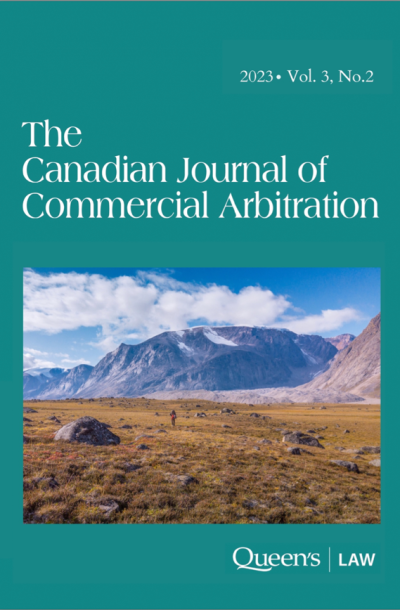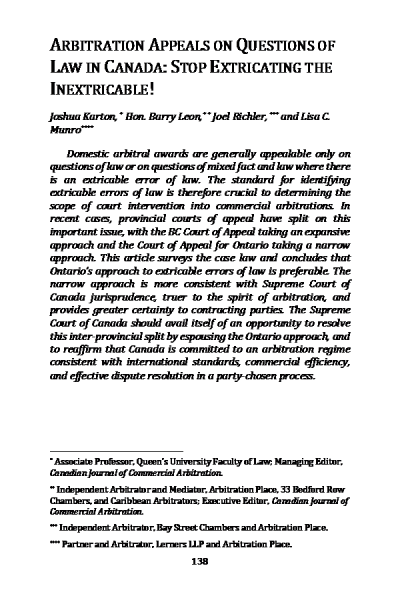Latest Issue - Volume Three, Issue Two: March 2023
FULL ISSUE PDF
EDITORS' NOTE
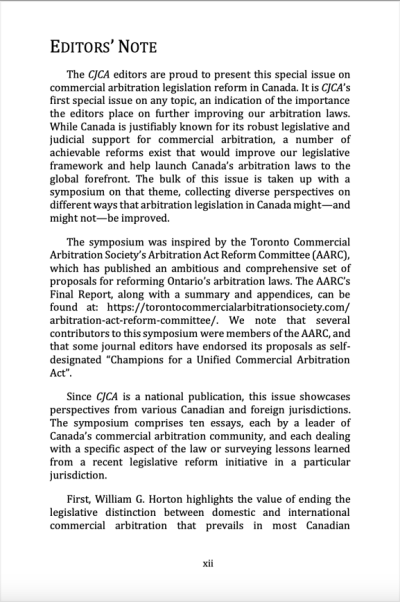
- Author
- Joshua Karton
- Pages
- xii – xv
- Introduction
- The CJCA editors are proud to present this special issue on commercial arbitration legislation reform in Canada. It is CJCA’s first special issue on any topic, an indication of the importance the editors place on further improving our arbitration laws. While Canada is justifiably known for its robust legislative and judicial support for commercial arbitration, a number of achievable reforms exist that would improve our legislative framework and help launch Canada’s arbitration laws to the global forefront. The bulk of this issue is taken up with a symposium on that theme, collecting diverse perspectives on different ways that arbitration legislation in Canada might—and might not—be improved.
A SINGLE ARBITRATION ACT FOR COMMERCIAL ARBITRATION: THE KEY RECOMMENDATION OF THE TORONTO COMMERCIAL ARBITRATION SOCIETY’S ARBITRATION ACT REFORM COMMITTEE
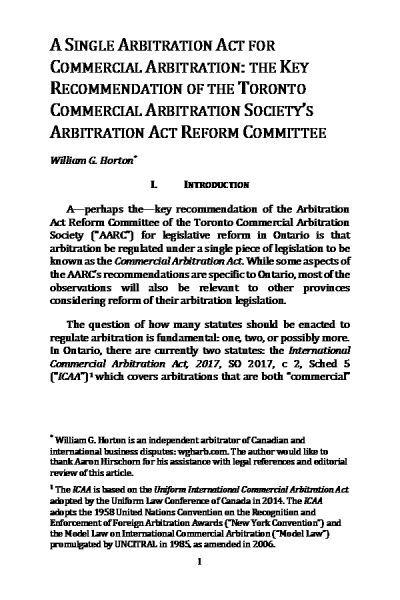
- Author
- William G. Horton
- Pages
- 1-22
- Introduction
- A—perhaps the—key recommendation of the Arbitration Act Reform Committee of the Toronto Commercial Arbitration Society (“AARC”) for legislative reform in Ontario is that arbitration be regulated under a single piece of legislation to be known as the Commercial Arbitration Act. While some aspects of the AARC’s recommendations are specific to Ontario, most of the observations will also be relevant to other provinces considering reform of their arbitration legislation.
ONE ACT TO RULE THEM ALL – MOVING TOWARDS A SINGLE COMMERCIAL ARBITRATION ACT
- Author
- Cynthia Kuehl
- Pages
- 23 – 33
- Introduction
- As a foundational issue, any legislative reform initiative must consider the reach of the statute. Should the statute continue its existing scope or is there a more effective means to accomplish the objectives of the legislature? Given the increasing reliance on arbitration for the determination of commercial disputes, this paper explores the reasons why legislative reform of the Ontario Arbitration Act1 (the “Act”) should include a transition to a single commercial arbitration act in Ontario for international and non-international commercial arbitration. Reform legislation would advance the interests of parties, counsel, the larger arbitration community, and the courts. Such was the conclusion of the Arbitration Act Reform Committee of the Toronto Commercial Arbitration Society (the “AARC”), and serves as a foundation for its proposal for legislative reform.
THE REFORM OF APPEALS PROVISIONS IN CANADIAN COMMERCIAL ARBITRATION STATUTES
- Author
- Joel Richler
- Pages
- 34 – 43
- Introduction
- Whenever reform of Canadian arbitration statutes is considered, the subject of appeals from awards is always a focus of acute attention. There are at least three reasons for this. First, apart from Québec and under the federal arbitration statute, every province has separate acts for domestic and international arbitrations. All the domestic acts permit appeals in certain circumstances, while all of the international acts—modeled on the UNCITRAL Model Law on International Commercial Arbitration (the “Model Law”)—make no mention of appeal rights and thus preclude appeals from awards.1 Without any apparent logical basis, there is a stark difference between domestic and international cases.
A REVIEW OF LEGISLATED SET-ASIDE REMEDIES: WHAT WORKS, WHAT DOESN’T, AND WHAT MAY NEED SOME TWEAKING
- Author
- J. Brian Casey
- Pages
- 44 – 54
- Introduction
- It has been over 30 years since Canada and the provinces introduced modern arbitration legislation. After the ratification of the New York Convention in 1985 through the United Nations Foreign Arbitral Awards Convention Act,1 Canada and the provinces went on to adopt the UNCITRAL Model Law on International Commercial Arbitration. Thereafter, many of the provinces used the Model Law as a framework for modernizing their domestic arbitration legislation,2 in a flurry of new legislation that ended in approximately 1991. This article will focus on what are known as the set-aside provisions in our legislation with a view to opining on what, after 30 years, still works, what doesn’t work, and what may just need some tweaking.
THE IMPORTANCE OF APPLYING INTERNATIONAL STANDARDS TO COMMERCIAL ARBITRATION STATUTES: MATTERS OF SUBSTANCE AND FORM[AT]
- Author
- Hon. Barry Leon
- Pages
- 56 – 68
- Introduction
- This article deals with two related topics concerning a reformed Ontario arbitration law. First, it sets out the case for applying international standards for all commercial arbitrations in Ontario in one commercial arbitration statute covering both international and non-international (domestic) arbitrations. Second, it considers whether an UNCITRAL Model Law-based1 arbitration statute should indicate where it differs from the Model Law, and if so, which provisions differ and how they differ.
ARBITRATION LEGISLATION REFORM IN CANADA: A VIEW FROM QUÉBEC

- Author
- Matthias Heilke, Laurence Ste-Marie, Stephen L Drymer
- Pages
- 69 – 83
- Introduction
- On January 1, 2016, Québec’s new Code of Civil Procedure went into effect, establishing a high-water mark for arbitration in Québec. The new CCP sought to simplify procedure and improve access to justice, in particular by encouraging what the National Assembly dubbed “private dispute prevention and resolution” (“PDPR”), primarily mediation and arbitration. PDPR is so central to Québec’s new CCP that parties now have an obligation to consider PDPR before referring a dispute to the courts, and that obligation appears in the very first article of the CCP.
UPDATING BC’S ARBITRATION ACT: LESSONS LEARNED

- Author
- Tina Ciccetti
- Pages
- 84 – 95
- Introduction
- On September 1, 2020, with the coming into force of British Columbia’s new Arbitration Act, the most recent chapter in the story of the evolution of BC’s arbitration legislation began. The Act modernized the Commercial Arbitration Act, RSBC 1996, c. 55 (the “Previous Act”), the non-international arbitration statute enacted in the 1980s.
THE “TABULA RASA” ILLUSION: PROCEDURAL NORMS AND PROCEDURAL FLEXIBILITY IN COMMERCIAL ARBITRATIONS

- Author
- Gerry Ghikas
- Pages
- 96 – 105
- Introduction
- Procedural flexibility is a hallmark of commercial arbitration, linked to the concept of party autonomy. Parties not only have the freedom to choose arbitration as the dispute resolution process, but also have the freedom, by agreement, to tailor the process to reflect their priorities. Given the volume of ink and exposition devoted to extolling the virtues of procedural flexibility and party autonomy, a person with limited experience in the arbitration process could be forgiven for imagining that the development of the detailed pre-hearing and hearing procedures for an arbitration begins with a tabula rasa; that is, that the parties and the arbitrators arrive at the first procedural conference with no specific expectations as to what the procedural steps will be. This is, of course, incorrect.
MOVING FORWARD WITH FEDERAL REFORMS

- Author
- Alexander M. Gay
- Pages
- 106 – 115
- Introduction
- Through the enactment of the Commercial Arbitration Act (“Commercial Arbitration Act”),1 the federal government adopted the 1985 version of the UNCITRAL Model Law, although with some significant changes. While arbitration is not a subject matter falling within federal constitutional jurisdiction, it is within the federal government’s jurisdiction to legislate with respect to the liability of the Crown and federal Crown agents.2 The enactment of a set of adjudicative rules to govern dispute resolution in contracts binding the federal government, such as the Commercial Arbitration Act, falls within this federal power. However, there are two large legislative gaps with the current state of affairs at the federal level. Firstly, the Commercial Arbitration Act does not include the amended 2006 UNCITRAL Model Law, which has been adopted by a host of nations and instead relies on the 1985 version. There are important differences between both versions and the Commercial Arbitration Act is not current.
DOMESTIC COMMERCIAL ARBITRATION REFORM IN CANADA: LESSONS FROM DOWN UNDER
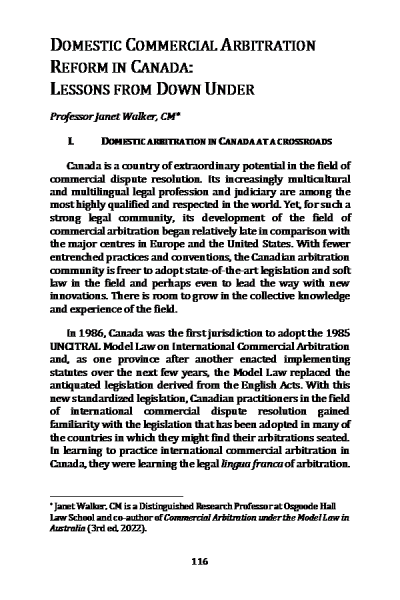
- Author
- Professor Janet Walker
- Pages
- 116 – 137
- Introduction
- Canada is a country of extraordinary potential in the field of commercial dispute resolution. Its increasingly multicultural and multilingual legal profession and judiciary are among the most highly qualified and respected in the world. Yet, for such a strong legal community, its development of the field of commercial arbitration began relatively late in comparison with the major centres in Europe and the United States. With fewer entrenched practices and conventions, the Canadian arbitration community is freer to adopt state-of-the-art legislation and soft law in the field and perhaps even to lead the way with new innovations. There is room to grow in the collective knowledge and experience of the field.
ARBITRATION APPEALS ON QUESTIONS OF LAW IN CANADA: STOP EXTRICATING THE INEXTRICABLE!
- Author
- Joshua Karton, Hon. Barry Leon, Joel Richler, and Lisa C. Munro
- Pages
- 138 – 166
- Abstract
- Domestic arbitral awards are generally appealable only on questions of law or on questions of mixed fact and law where there is an extricable error of law. The standard for identifying extricable errors of law is therefore crucial to determining the scope of court intervention into commercial arbitrations. In recent cases, provincial courts of appeal have split on this important issue, with the BC Court of Appeal taking an expansive approach and the Court of Appeal for Ontario taking a narrow approach. This article surveys the case law and concludes that Ontario’s approach to extricable errors of law is preferable. The narrow approach is more consistent with Supreme Court of Canada jurisprudence, truer to the spirit of arbitration, and provides greater certainty to contracting parties. The Supreme Court of Canada should avail itself of an opportunity to resolve this inter-provincial split by espousing the Ontario approach, and to reaffirm that Canada is committed to an arbitration regime consistent with international standards, commercial efficiency, and effective dispute resolution in a party-chosen process.
COMITY AND THE ANTI-SUIT INJUNCTION: DEVELOPMENTS SINCE AMCHEM

- Author
- Stephen Armstrong
- Pages
- 167 – 180
- Introduction
- The anti-suit injunction is a controversial form of relief. The House of Lords has described it as an “important and valuable” remedy that promotes the objectives of commercial arbitration. The Supreme Court of Canada has described it as an “aggressive remedy” that “raises serious issues of comity”. Consonant with its remarks, the Supreme Court of Canada created a high bar to obtain an anti-suit injunction in Amchem Products Incorporated v British Columbia (Workers' Compensation Board) (“Amchem”). The Supreme Court’s cautionary approach is apposite where a claimant seeks anti-suit injunctive relief on the basis that they are being vexed or oppressed by legal proceedings commenced in a foreign forum. The Alberta Court of Appeal’s recent decision in Pe Ben Oilfield Services (2006) Ltd v Arlint (“Pe Ben”) reinforces that view. However, neither Amchem nor Pe Ben were concerned with the enforcement of arbitration agreements.
A YEAR IN REVIEW OF CANADIAN COMMERCIAL ARBITRATION CASE LAW (2022)

- Author
- Lisa C. Munro
- Pages
- 181 – 197
- Introduction
- Every year, a handful of Canadian court decisions touching on commercial arbitration issues capture the interest and imagination of arbitration practitioners because these cases signify a new trend, clarify or change the law, raise novel principles, or just because they have surprising outcomes. This brief review presents a snapshot of the most “buzzworthy” decisions released in 2022. These cases highlight three main themes that emerged as key trends in 2022: (1) decisions binding non-signatories to arbitration agreements; (2) court reviews of tribunal preliminary jurisdiction rulings; and (3) a perennial topic with a new twist, appeals of arbitral awards on an extricable question of law.
